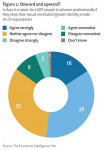Despite rise of virtual interaction, face-to-facecollaborations still have the best chance of success
The study also found that the term collaboration is used to cover a broad range of interactions, from meetings to schedule internal handoffs or coordination of tasks to major initiatives among multiple partners to develop and distribute new products. The simpler the project and the more it is focused on internal processes, the less trust is required - which is a good thing, because trust is far from universal even within the same function or business unit.
“The study demonstrates the need for more rigorous distinctions among different types of collaboration,” said Economist Intelligence Unit Senior Editor Dan Armstrong, the editor of the report. “Labelling every initiative as ‘collaboration’ creates a misnomer that robs companies of the ability to deploy resources efficiently and effectively to create the most value. For instance, trust-building exercises or face-to-face meetings may be unnecessary in some situations and important in others.”
Other key findings of the study include:
The best collaborators want first and foremost for their partners - both individuals and organisations - to have integrity, ie being honest and ethical. Collaborators also want tangible demonstrations of good faith, such as shared information. Those who are very good at collaborating are significantly more likely to say honesty, ethical behaviour, and a willingness to exchange information are critical (as opposed to just important) when deciding whom to trust.
Many executives are disappointed with their collaborators. Qualities that survey respondents see as key to trustworthiness are rarely displayed- by organisations or individuals - to the degree that they had hoped. However, very good collaborators are more likely to report honesty and integrity in collaborative partners.
Complete trust is very rare - but it often doesn’t matter. Very few collaborators totally trust their counterparties (people or organisations). Poor collaborators trust counterparties even less. However, issues of trust rarely torpedo today’s collaborations. Most collaborators expect and forgive lapses in judgment, though they are less tolerant of malicious intent.
Companies have yet to find or embrace a consistent way to measure trust. Word-of-mouth is still the most trusted currency for assessing trust in another person or organisation. However, the best collaborators are significantly more likely to conduct greater due diligence on trust.
Trust, as well as project success, appears to increase in face-to-face interactions. Meeting a person face-to-face tends to catalyse the interaction and help to turn a transaction into a relationship. There is also a significant positive correlation between face-to-face communication and project success.
Many companies will consider continuing a collaborative project despite serious breaches of trust. The knowledge that a partner has broken the law is almost certain to end a collaborative relationship. But only 65% of executives said they would halt a relationship if they learned that a partner had deliberately misled them to benefit themselves, and only 63% would do so if a partner shared proprietary information beyond the organisation. Respondents consider actions like these serious, and say that they degrade the level of trust, but by themselves these actions may not be sufficient to halt a project.
Very good collaborators pay more attention to business risks. These risks include relying exclusively on a partner (limiting opportunity) and following procedures that circumvent company practice. Poor collaborators are less likely to be concerned about those issues, but are more likely to be insecure about their position - for example, seeing more risk in delegating important tasks to a partner.
웹사이트: http://www.eiu.com
연락처
Edgar Fernandez
Marketing Manager, Asia-Pacific
(852) 2585 3826 이메일 보내기
Fax: (852) 2802 7007
이 보도자료는 Economist Intelligence Unit가(이) 작성해 뉴스와이어 서비스를 통해 배포한 뉴스입니다.




